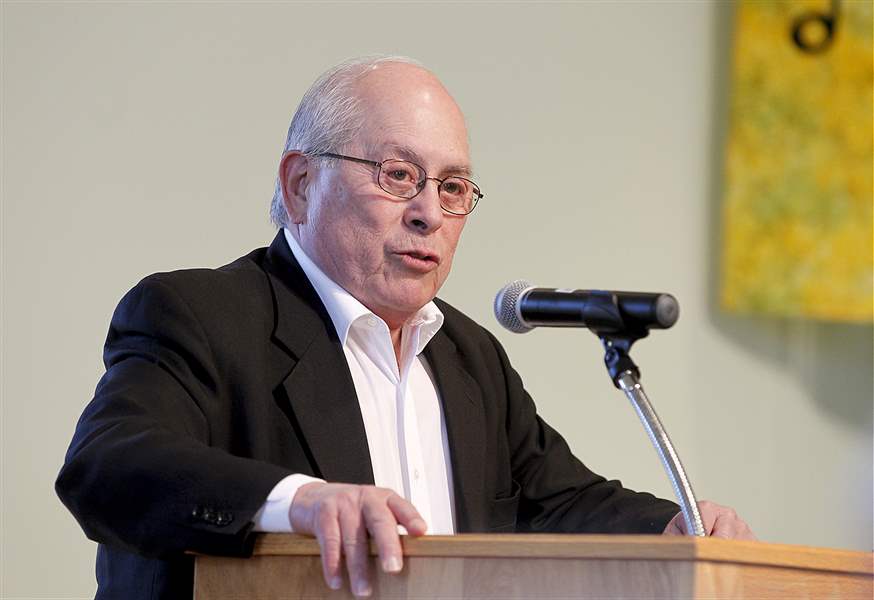
Labor leader advocates for immigrants, families in Bowling Green
Baldemar Velasquez discusses importance of assisting families at risk of being deported
4/10/2017
Baldemar Velasquez, president of the Farm Labor Organizing Committee, speaks at Maumee Valley Unitarian Universalist Congregation in Bowling Green about the issues facing illegal immigrants in the United States.
THE BLADE/JETTA FRASER
Buy This Image
BOWLING GREEN — Baldemar Velasquez has spent his life organizing farm workers and helping the poor speak for themselves.
Known for leading boycotts on behalf of migrant workers, Mr. Velasquez also advocates for illegal immigrants in the United States. He shared that passion Sunday during a Bowling Green speech in which he discussed the importance of assisting families at risk of being deported.
“With the undocumented people, there are other challenges,” he told roughly 40 people gathered at Maumee Valley Unitarian Universalist Congregation’s church. “A lot of it has to do with their legal status, which many times is used against them.”
Without the same ability to speak out, Mr. Velasquez said illegal immigrants are particularly vulnerable.
He estimated Toledo is home to 6,000 to 10,000 illegal immigrants, and he has worked with Advocates for Basic Legal Equality to set up a family preparedness plan for those individuals and families if they are arrested.
Mr. Velasquez will be “adopting” a family and is seeking volunteers to do the same. Maumee Valley Unitarian Universalist Congregation could sign up for that task.
“I would like our church to get more involved, perhaps to adopt an undocumented family,” congregation president Steve Israel said. “You can't help but ask yourself what can I do to make a difference.”
Other attendees also left inspired to act, though not exactly sure how they wanted to get involved.
Marilyn Bowlus said she knew there was a large Mexican-American population in her hometown of Pemberville, and had wondered how immigration enforcement affected them.
“I don't know what I'll do,” she said, “but at least I'm a little more educated.”
Mr. Velasquez also shared stories from his life in poverty as a migrant farmer in northwest Ohio, which drove him to start the Farm Labor Organizing Committee almost 50 years ago. FLOC started by advocating for workers with their direct employers, but shifted to negotiating collective bargaining agreements with large corporations, such as Campbell Soup Co. and the Mount Olive Pickle Co.
“When I started organizing the [farm workers] I realized it wasn’t the entire picture, just us and that farmer whose field we were working on,” he said. “That product we were picking has some sort of structural program.”
Since so many companies cross national borders, his work increasingly includes negotiating with foreign companies and partnering with international labor unions. He wants individuals to be free to travel for work wherever it takes them, and to retain their labor rights wherever they find themselves.
“Why are you afraid of competing against uneducated Mexicans?” he said to those who would worry about immigrants taking jobs.
Achieving his goals — which range from large-scale collective bargaining agreements to getting new street lights in South Toledo — means bringing the poor and marginalized together so they can advocate for themselves, he said.
“You need organized people in the neighborhoods to help you do those things,” he said. “You want to talk about the poor and organizing the poor? Let them speak for themselves.”
Contact Zack Lemon at: zlemon@theblade.com, 419-724-6282, or on Twitter @zack_lemon.